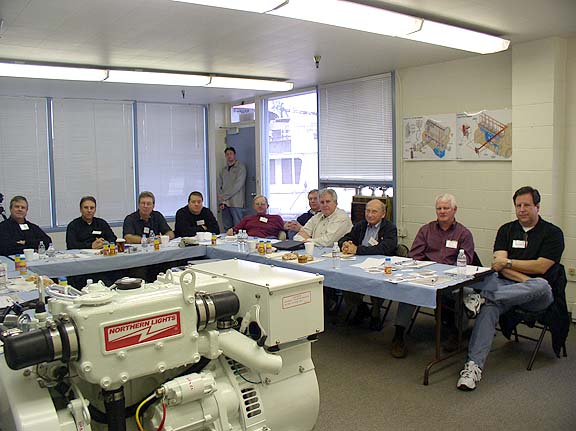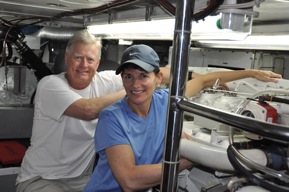
Lugger Class
Trawler Blogs sat down (virtually) for an interview with “Lugger Bob” Senter to ask him a few questions about trawlers, diesel engines, and spare parts. This is the first of our two part interview with Bob.
1. Tell us about the differences between 668 and ECU 1066? Apparently, Nordhavn has stockpiled 668s expecting ocean cruisers to want the tried and true more user serviceable “old school” engine. What is your opinion of the 1066 compared to the 668?
The LP668 is exactly the same as the L1066 except for the addition of a Stanadyne DE-10 (1000 Bar = 15,000 PSI) electronically controlled rotary fuel injection pump. They are both incredibly reliable engines. The L1066 may be the only full authority electronic engine on the planet that allows an owner to diagnose any problem with ordinary hand tools, the engine manual, a multimeter and the trouble code display. The engine’s electronic rotary fuel injection pump is simpler than the mechanical one it replaced and provides higher pressure, more accurate fuel delivery. So, it has a very slight fuel economy edge on the non-electronic engine despite having to meet much more stringent Tier II marine exhaust emission laws. People like to say they can fix the mechanical engines themselves if something goes wrong, but if a mechanical fuel injection pump fails, the owner can’t fix it himself – that requires a fuel injection shop. The electronic pump is less likely to fail since it’s a lot more robust, but it also requires a small electronic control unit (ECU). You can carry a spare – like carrying a spare GPS – and replace it in 5 minutes if there were ever a problem.
2. What do you recommend when it comes to diesel additives?
Stanadyne Performance Fuel Conditioner. If that’s not available, Power Service “Diesel Kleen”.
3. What is your top-10 spare list and why?
Good metric and U.S. standard size tool kit
When things go wrong on a cruise, the nearest helping hand is usually at the end of your arm. Equip and educate yourself accordingly.
Good quality multimeter (DVOM), Example: Fluke
Electrical problems are much more intuitive and easier to solve with a good meter. Don’t buy one so expensive that you’ll have a heart attack if it falls in the bilge, but spend more than $100.
Hand held IR non-contact temperature gun
Hot on the heels of fuel system issues (mostly plugged filters), the next most common problems are cooling system related. A hand held temp gun is invaluable.
Big tube of silicon dielectric gel lubricant
Cures electrical problems before they happen and it’s your best friend when changing impellers or sanitation system hoses.
Spare impellers and cover gaskets or O-ring
Change them at least once a year and have spares in case you suck up a plastic bag, kelp or jelly fish.
Abundant spare fuel filters, primary and secondary
You can never have too many spare fuel filters aboard, unless they are 2-micron Racors; those are NEVER, ever OK to use in primary filters.
Electrical repair kit including fuses, breakers and bulbs
Between the triple evils of salt water, salt air and expedient electrical installations, you’ll have plenty of need for your electrical box of tricks.
Domestic water pressure pump with appropriate electrical and water connections pre-tested
Water pressure pumps only fail when you are cruising in places where you can’t get a replacement. You’ll hate yourself for not carrying a spare.
Portable inverter
Inverters suffer unpredictable deaths and many boats rely on navigation computers or laptops that can’t live without AC power. A small spare inverter is relatively inexpensive insurance.
Head repair kit
Hopefully, you won’t need to fix a head on a cruise, but you’ll be very happy you thought to pack a spare.
4. Your 48′ Tollycraft CPMY is for sale. What are your future cruising plans? Will you be in the market for a new boat? Which model? Why?
Last spring, I downsized to a smaller 28′ single engine cruiser that is (barely) trailerable and can follow the seasons when I get tired of bad weather. I hope to continue enjoying boating into eventual retirement and a smaller boat’s fixed expenses are more manageable.
5. Tell us about life in Port Townsend.
Port Townsend is a fairly quiet, definitely quaint & quirky ex-Victorian wooden boat building capitol, population 9000. We’re blessed with clean air & water, beautiful trees and the Puget Sound and Canadian waters are at your front door. Seems like there’s always some kind of festival going on, like the Wooden Boat Building Festival, Jazz Festival, Classic Film Festival, Rhododendron Festival and the not to be missed Kinetic Art Sculpture Festival. Culturally, the area is a combination of Berkeley politics, blue collar maritime industry, artists, musicians, local organic farmers and quiet retired folks. You can count the stop lights on one hand; just the right number. If you’re feeling a little isolated and in need of frenetic urban energy, Seattle is about 2 hours away by car and ferry.
6. There’s a lot of discussion on the forums about proper engine size. What advice do you have to offer in this area?
For passage making cruisers, insist on a continuous duty rated engine that will be operating at 50% load at the boat’s economical but practical cruising speed. This is typically SL ratio 1.1 – 1.2. (Square root of waterline length x 1.1 or 1.2 = knots). Putting it in real world terms: the engine that comes with with boat is most likely twice as big and powerful as it should be. There is NO SUCH THING as a dual mode displacement/planing hull that offers long range economy at displacement speeds without causing eventual engine damage and/or short engine life. Boat builders and sales types who claim otherwise are not being truthful about the effects on the engine(s). Speed costs money (lots of it in boats) – how fast do you want to go?
7. Tell us about Lugger and the value that Lugger provides over a regular John Deere engine?
Northern Lights, Inc. purchases industrial duty (not highway or light duty) diesel engines from at least five heavy duty diesel engine manufacturers for marinization in Northern Lights generator applications. A few become Lugger propulsion engines. Northern Lights’ Seattle factory designs, develops, builds and tests all of the external cooling systems, air systems, exhaust systems, accessory drives and mounting/packaging components. All of the engineering is based on decades of experience building marine engines and generators for the harsh, absolutely unforgiving Alaskan fishing and commercial industries. That is obvious in every external part. Eliminating complexity and using heavy duty, premium quality materials makes a huge difference in reliability and serviceability, although it also adds more expense and weight than competitive products. John Deere supplies many base industrial engines used in Northern Lights products and, in my opinion, some Deere industrial engines are the very best you could buy anywhere in the world. In years past, various diesel manufacturers have proven how easy it is to ruin the reputation of a good engine by marinizing it. My experience is that Northern Lights does just the opposite, by improving the engine with an artfully designed, rock solid marinization package. Since Northern Lights builds only marine products, they support the products, dealers and customers much better than companies that serve many other much larger markets. From my perspective, Northern Lights’ ‘cost-no-object’ engineering, hand-built quality, first rate customer support and eventual added resale value are an incredible combination. Definitely worth every penny invested up front.
8. You teach the Northern Lights Hands-On Diesel Engine Class that consistently gets excellent reviews from participants. Tell us about the classes you teach.
After being owned by half a dozen boats over the last 40 or so years, I’ve seen similar maintenance issues repeated many times, with some minor variations on the ocean crossings. Most of the problems could have been prevented while moored comfortably and a very few were from parts that just gave up unexpectedly or challenged your skills at carrying spares. Almost everything a boat owner needs to know is simple and relatively easy to grasp, so I emphasize the basics, prevention and understanding how the systems work, well enough to accomplish repairs under way or to talk the language with a tech.
9. How did you get your nickname, “Lugger Bob”?
 While crewing aboard a Nordhavn 57 on the Nordhavn Atlantic Rally in 2004, I was called to the VHF during the evening fleet roll call. A woman aboard one of the boats was worried that something might go wrong with their engine while we were over a thousand miles from land. She asked what to do to make sure their engine kept running reliably. I suggested continuing the hourly engine room checks, making sure the oil, coolant and filters are OK and once a day, “Hug your Lugger”. Apparently, they started calling me Lugger Bob soon afterward. (There is actually some technical basis in those suggestions: most problems occur in boats that don’t receive hourly engine room checks – and who wants to hug a leaky, dirty engine?)
While crewing aboard a Nordhavn 57 on the Nordhavn Atlantic Rally in 2004, I was called to the VHF during the evening fleet roll call. A woman aboard one of the boats was worried that something might go wrong with their engine while we were over a thousand miles from land. She asked what to do to make sure their engine kept running reliably. I suggested continuing the hourly engine room checks, making sure the oil, coolant and filters are OK and once a day, “Hug your Lugger”. Apparently, they started calling me Lugger Bob soon afterward. (There is actually some technical basis in those suggestions: most problems occur in boats that don’t receive hourly engine room checks – and who wants to hug a leaky, dirty engine?)
10. What is the right sized boat?
I hear this a lot and it’s an interesting thread being lobbed around the Nordhavn Dreamers site right now.
My take on the subject: If you’re talking about Nordhavns, any model 40′ and larger will safely transport you to any seawater destination on the planet, and the smaller boats can go places the bigger ones can’t. Finding transient berthing in marinas is generally a bit easier in smaller boats, too. When you’re in your berth and the lights are out, they all look and feel the same. The final test: stand anywhere in the boat (except the head), spread your arms and legs apart as far as possible. That’s all the space you need; everything else is a luxury for those who can afford more. Bigger boats may ride better but they are exponentially more maintenance intensive. Unless you can afford crew, you’ll spend less time enjoying boating and more time doing maintenance. Just about every salty cruiser gives the same advice: Don’t keep waiting for exactly the perfect boat to come along or exactly the right time to go; just do it now! Most regrets in life are about the things you never tried.
Do you have a question for Bob? Post your questions below in our comments section. Or read more about the Northern Lights Hands-On Diesel Engine Class.

Comments are closed.